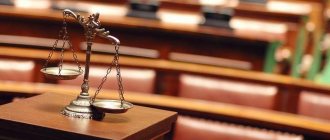New edition of Art. 319 Code of Criminal Procedure of the Russian Federation
1. In cases where the submitted application does not meet the requirements of parts five and six of Article 318 of this Code, the magistrate makes a decision to return the application to the person who submitted it, in which he invites him to bring the application into compliance with the specified requirements and sets a deadline for this. In case of failure to comply with this instruction, the magistrate refuses to accept the application for his proceedings and notifies the person who filed it.
1.1. If the submitted application does not meet the requirements of paragraph 4 of part five of Article 318 of this Code, the magistrate refuses to accept the application for his proceedings and forwards the said application to the head of the investigative body or the head of the inquiry body to decide on the initiation of a criminal case in accordance with part four of the article. 20 of this Code, which is notified by the person who submitted the application.
1.2. If an application is filed in relation to a person specified in paragraph 2 of part one of Article 147 of this Code, then the magistrate refuses to accept the application for his proceedings and forwards the said application to the head of the investigative body to decide on the initiation of a criminal case in the manner established by Article 448 of this Code , which is notified by the person who submitted the application.
2. At the request of the parties, the magistrate has the right to assist them in collecting such evidence that the parties cannot obtain independently.
3. If there are grounds for scheduling a court hearing, the magistrate, within 7 days from the date of receipt of the application to the court, summons the person in respect of whom the application was filed, acquaints him with the materials of the criminal case, hands him a copy of the submitted application, explains the rights of the defendant in the court session provided for Article 47 of this Code, and finds out who, in the opinion of this person, needs to be called to court as witnesses for the defense, about which a signature is taken from him.
4. If the person against whom the application was filed fails to appear in court, a copy of the application explaining the rights of the defendant, as well as the conditions and procedure for reconciliation of the parties, is sent to the defendant.
4.1. If, after accepting the application for proceedings, it is established that the person in respect of whom the application was filed belongs to the category of persons specified in Article 447 of this Code, then the magistrate makes a decision to cancel the decision to accept the application of the victim or his legal representative for his proceedings and sends materials to the head of the investigative body to resolve the issue of initiating a criminal case in the manner established by Article 448 of this Code, of which he notifies the victim or his legal representative.
5. The magistrate explains to the parties the possibility of reconciliation. If applications for reconciliation are received from them, the proceedings in the criminal case, by decision of the magistrate, are terminated in accordance with part two of Article 20 of this Code, with the exception of proceedings in criminal cases initiated by the investigator, as well as with the consent of the prosecutor by the inquiring officer in accordance with part four of Article 147 of this Code, which may be terminated in connection with the reconciliation of the parties in the manner established by Article 25 of this Code.
6. If reconciliation between the parties is not achieved, then the magistrate, after fulfilling the requirements of parts three and four of this article, appoints a hearing of the criminal case in a court hearing in accordance with the rules provided for by Chapter 33 of this Code.
Commentary on Article 319 of the Code of Criminal Procedure of the Russian Federation
1. The commented article establishes the powers of a judge in a criminal case of private prosecution. At the same time, the legislator meant that the magistrate has jurisdiction over all criminal cases of private prosecution without exception, since they have the properties specified in Part 1 of Art. 31 Code of Criminal Procedure of the Russian Federation.
2. The general procedure for the activities of a magistrate in terms of criminal proceedings, in addition to the Code of Criminal Procedure of the Russian Federation, is also established by Federal Law of December 17, 1998 No. 188-FZ “On magistrates in the Russian Federation.”
3. If the application does not meet the requirements for it, the magistrate makes a decision to return the application to bring it into compliance with the requirements of the law. This document must indicate which specific requirements from those provided for in Parts 5 and 6 of Art. 318 of the Code of Criminal Procedure of the Russian Federation, the application does not comply, and there must be a specific deadline by which the shortcomings of the application must be eliminated.
4. If the requirements to eliminate the deficiencies by the established deadline have not been met, then the magistrate issues a decision to refuse to accept the application for proceedings. This act must indicate which requirements the previously submitted application does not meet, and state that its shortcomings were not corrected by the specified deadline.
The applicant is notified of the decision. In addition, it is explained to him that within 10 days, the magistrate’s decision to refuse to accept the application can be appealed to the district court, which in this case acts as a court of second instance.
5. If the application submitted to the magistrate does not contain information about the person who committed the act, then the magistrate, by virtue of Part 1.1 of the commented article, sends the application to the head of the investigative body or the head of the inquiry body to initiate a criminal case in the manner established by Part 4 of Art. 20 Code of Criminal Procedure of the Russian Federation. In this case, the judge must be guided by the rules on jurisdiction. However, the very fact of filing an application does not mean that the judge orders the initiation of a criminal case, since the decision to initiate a criminal case or to refuse to initiate one is made by the investigator and the inquiry officer (the latter with the consent of the prosecutor) based on their own internal convictions.
6. If it is necessary to initiate a criminal case against a person to whom a special procedure for criminal proceedings is applied (Chapter 52 of the Code of Criminal Procedure of the Russian Federation), the magistrate sends an application for a decision on it in accordance with Art. 448 of the Code.
7. If the parties cannot independently obtain certain evidence, then, at their request, the magistrate has the right to make a decision to assist the parties in collecting evidence.
The document must indicate what kind of evidence the representative of the prosecution or defense requested to collect. Specific reasons for granting the request or refusing it are also given. If the petition is partially satisfied, the magistrate must indicate exactly in which part it was granted and in which part it was not.
8. In criminal cases of private prosecution initiated at the request of the victim or his legal representative (Part 1 of Article 318 of the Code of Criminal Procedure of the Russian Federation), the judge can decide the issue of ordering an examination when they submit an application to the court or at the stage of trial by issuing an appropriate resolution. In this case, the rights of the accused, the defendant, as well as the victim, established by the criminal procedure law, must be respected.
9. Part 3 of the commented article establishes the procedure for notifying the person against whom the application was filed with the materials of the criminal case, as well as explaining to him the content of his procedural status. The fact that the person is explained not only his rights, but also the opportunity to call defense witnesses to court, ensures the most complete realization of the person’s rights during the trial before the magistrate.
In this case, we are talking about the materials of a criminal case, since it is considered initiated from the moment the court accepts the application for its proceedings and grants the person the status of a private prosecutor.
10. Failure to appear in court by the person against whom the application was filed is not an obstacle to the subsequent consideration of the criminal case by a magistrate. All necessary documents specified in part 4 of the commented article are sent to the defendant via communication means. At the same time, the court does not have the right to bring that person in to become familiar with the application filed against the person and other materials of the criminal case.
11. If, after filing the application, it becomes clear that proceedings against the person should be carried out in a special manner, then the magistrate cancels his initial decision to accept the application for proceedings and sends materials for organizing criminal proceedings in the manner prescribed by Chapter. 52 of the Code of Criminal Procedure of the Russian Federation. In particular, this happens if a criminal case was previously initiated based on the commission of the act.
12. The parties, in accordance with Part 5 of the commented article, must be explained that they have the possibility of reconciliation. At the same time, the magistrate does not have the right to induce the parties to reconcile by misleading or other illegal means. Applications for reconciliation are submitted in written or oral form. Upon receipt of an oral statement, the magistrate draws up a protocol, which is signed by the parties.
13. If an application for reconciliation has been received from both parties, then the criminal case is subject to mandatory termination (Part 2 of Article 20 of the Code of Criminal Procedure of the Russian Federation). The resolution to terminate the criminal case in connection with the reconciliation of the parties must contain information about the actual circumstances under which reconciliation was achieved between the parties.
14. Only after the magistrate determines that reconciliation has not taken place, he, by virtue of Part 6 of the commented article, makes a decision to schedule a court hearing. The document states, among other things, that all procedural issues regarding the parties have been clarified, and that reconciliation between the parties has not been achieved. The resolution reflects the date and time of the start of the consideration of the criminal case, as well as other information related to preparation for the court hearing (Chapter 33 of the Code of Criminal Procedure of the Russian Federation).
Everything about criminal cases
Go to the text of the Code of Criminal Procedure
Url Additional information:
Return of complaint
- part 1 319 of the Code of Criminal Procedure
if the requirements for the application are violated, the complaint is returned
- part 1 319 of the Code of Criminal Procedure
a decision is made to return for correction
Refusal to accept an application
— Part 1 319 Code of Criminal Procedure
if the deficiencies in the application are not corrected
- Part 1.1 319 Code of Criminal Procedure
if there is no information about the criminal, the materials are transferred to the police
- Part 1.2 319 Code of Criminal Procedure
if the application is filed in relation to a special subject
- part 4.1 319 Code of Criminal Procedure
cancellation of the decision if the special subject is identified later
Acceptance of application
- Part 2 319 Code of Criminal Procedure
assistance in collecting evidence at the request
- Part 3 319 Code of Criminal Procedure
within 7 days the judge summons the accused
- Part 3 319 Code of Criminal Procedure
introduces him to the materials
- Part 3 319 Code of Criminal Procedure
hands over a copy of the submitted application
- Part 3 319 Code of Criminal Procedure
explains the rights of the defendant
- Part 3 319 Code of Criminal Procedure
finds out who to call as defense witnesses
- Part 4 319 Code of Criminal Procedure
in case of no-show, a copy is sent
Reconciliation of the parties
- Part 5 319 Code of Criminal Procedure
judge explains the possibility of reconciliation
- Part 5 319 Code of Criminal Procedure
upon applications for reconciliation, the case is terminated
- Part 5 319 Code of Criminal Procedure
for cases initiated by the prosecutor, a different mechanism (
25 Code of Criminal Procedure
)
- Part 6 319 Code of Criminal Procedure
if reconciliation is not reached, a hearing of the case is scheduled
Article 319 of the Code of Criminal Procedure. Powers of a magistrate in a criminal case of private prosecution
Url Additional information:
— Part 3 389.2 Code of Criminal Procedure
this decision can be appealed
1) In cases where the submitted application does not meet the requirements of Part 5 and Part 6 of the 318 Code of Criminal Procedure, the magistrate:
— makes a decision to return the application to the person who submitted it, in which he invites him to bring the application into compliance with the specified requirements,
- and sets a deadline for this,
- in case of failure to comply with this instruction, the magistrate refuses to accept the application for his proceedings and notifies the person who filed it about this.
1.1) If the submitted application does not meet the requirements of paragraph 4 of part 5 of 318 Code of Criminal Procedure, the magistrate:
Url Additional information:
— Part 3 389.2 Code of Criminal Procedure
this decision can be appealed
- refuses to accept the application for its proceedings,
Url Additional information:
If there is no information about the criminal
- Part 4 20 Code of Criminal Procedure
if information about the criminal is not known, a case is initiated
- Part 2 147 Code of Criminal Procedure
no information about the criminal, the judge refuses the application
— paragraph 29
Plenum No. 17 lack of information from the victim about the perpetrator
- paragraph 14
order of the Investigative Committee No. 72 if the person in the private prosecution case is not known
- and sends the said application to the head of the investigative
body or the head of the inquiry body to resolve the issue of initiating a criminal case in accordance with Part 4 20 of the Code of Criminal Procedure, of which the person who filed the application is notified.
1.2) If the application is filed in relation to the person specified in paragraph 2 of part 1 of 147 Code of Criminal Procedure, then the magistrate:
- refuses to accept the application for its proceedings,
- and sends the said application to the head of the investigative body to resolve the issue of initiating a criminal case in the manner established by 448 of the Code of Criminal Procedure,
— what the person submitting the application notifies about.
Url Additional information:
- P.16
Plenum No. 28 examination at the application stage
2) At the
request of the parties, the magistrate has the right to assist them in collecting such evidence that the parties cannot obtain independently.
3) If there are grounds for
scheduling a court hearing, the magistrate:
- within 7 days from the date of receipt of the application to the court, calls the person in respect of whom the application was filed,
- introduces him to the materials of the criminal case,
— hands over a copy of the submitted application,
Url Additional information:
— clause 8
Plenum No. 60, the magistrate is obliged to explain the right to a special procedure
— explains the rights of the defendant in a court hearing, provided for in 47 Code of Criminal Procedure,
- and finds out who, in the opinion of this person, needs to be called to court as witnesses for the defense, about which a signature is taken from him.
4) If the person against whom the application is filed fails to appear in court, a copy of the application explaining the rights of the defendant, as well as the conditions and procedure for reconciliation of the parties, is sent to the defendant.
4.1) If, after accepting the application for proceedings, it is established that the person in respect of whom the application was filed belongs to the category of persons specified in 447 of the Code of Criminal Procedure, then the magistrate:
- makes a decision to cancel the decision to accept the application of the victim or his legal representative for its proceedings,
- and sends the materials to the head of the investigative body to resolve the issue of initiating a criminal case in the manner established by 448 of the Code of Criminal Procedure,
— what the victim or his legal representative is notified about.
Url Additional information:
- paragraph 31
Plenum No. 17, the court is obliged to terminate the reconciliation case
5) Justice of the peace:
— explains to the parties the possibility of reconciliation.
Url Additional information:
- Part 5 319 Code of Criminal Procedure
upon applications for reconciliation, the case is terminated
— paragraph 31
Plenum No. 17, the court is obliged to terminate the reconciliation case
Refusal of charges
Refusal of the private prosecutor
from the prosecution a way to dismiss the case
If applications for reconciliation are received from them, the criminal proceedings by decision of the magistrate are terminated in accordance with Part 2 20 of the Code of Criminal Procedure,
- with the exception of proceedings in criminal cases initiated by the investigator, as well as with the consent of the prosecutor by the interrogating officer in accordance with Part 4 147 of the Code of Criminal Procedure, which can be terminated in connection with the reconciliation of the parties in the manner established by 25 of the Code of Criminal Procedure.
6) If reconciliation between the parties is not achieved, then the magistrate, after fulfilling the requirements of part 3 and part 4 of this article, appoints the consideration of the criminal case in a court hearing in accordance with the rules provided for by Chapter 33 of the Criminal Procedure Code.
Return to the text of the Code of Criminal Procedure
Seek advice
Terms and concepts
In the articles of the Code of Criminal Procedure, the concept of “crimes committed in the field of entrepreneurial activity” is replaced by “crimes committed by an individual entrepreneur in connection with the implementation of entrepreneurial activities and (or) management of property belonging to him, used for the purposes of entrepreneurial activity, or if these crimes are committed by a member of the body management of a commercial organization in connection with the exercise of its powers to manage the organization or in connection with the implementation by a commercial organization of entrepreneurial or other economic activities.”
The provisions of Article 164 of the Code of Criminal Procedure of the Russian Federation on preventing the unreasonable use of measures that may lead to the suspension of the legitimate activities of legal entities or individual entrepreneurs, including the unjustified seizure of electronic storage media, during investigative actions are extended to criminal cases of crimes provided for in Article 201 of the Criminal Code of the Russian Federation “Abuse of Power” "
Objects and documents, including electronic media, seized during pre-trial proceedings in criminal cases for crimes under Article 201 of the Criminal Code of the Russian Federation are recognized as material evidence and are added to the materials of the criminal case. Article 81.1 of the Code of Criminal Procedure of the Russian Federation clarifies the procedure for recognizing tools, equipment or other means of committing a crime as material evidence when committing a crime:
- an individual entrepreneur in connection with his business activities and (or) management of his property used for business purposes;
- a member of the management body of a commercial organization in connection with the exercise of powers by him to manage the organization or in connection with the implementation of entrepreneurial or other economic activities by a commercial organization.





